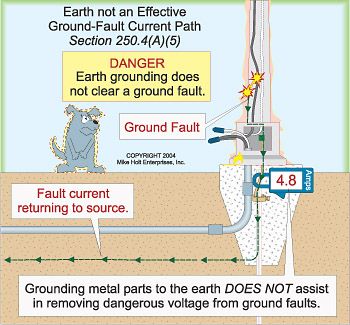Gunning
Here is a thread that I helped a member do some experiments a few years back he was in Houston in a very carbon rich soil area that had a very low ohms per cm reading, if you want to learn more about why I make the statement that ground rods are about useless, read that thread as it was an eye opener for many who did not understand how the connection of electrode to earth works.
Here is why even if you place a ground rod in water it will not really lower the resistance of this connection to earth very much and may increase the voltage drop in a much shorter distance from the electrified metal that the person receives a shock from placing a grater potential across the two points of contact:
It is not the Earth as a whole that is a bad conductor because we know that the Earth has many parallel paths and will always as a whole be a very low resistance and as some papers has pointed to it can be considered as having a 0 ohm impedance because of all the parallel paths run into infinity.
The reason we have a much higher resistance on a ground rod is because of the small area of Earth or soil that is around the rod or connection point, there is only so much soil that will come into contact with a rod and so little amount of soil in the area around the rod that there is less parallel paths to combine that would lower the resistance.
And this is why the shells around a rod have the largest voltage drop in the shell closest to the rod as shown in the graphic shown above. this holds true even if the ground rod is in water, for the same reason so very little water will be in contact with the rod, and the same reason that even in water the greatest voltage drop will be in the shells closest to the rod, apply a voltage to the rod in the water and you will have a very high voltage drop not that far from the rod, it is this voltage drop that is was gets people in the water because their body is at two different potentials in a very short distance, as you will read in the link above, these shells are smaller where you have a lower ohms per cm soil, water is no different, the more conductive of the water the smaller is the shell around the electrode which means a higher voltage drop across a shorter distance from the rod, salt water has a shell of about 9" where the voltage will drop 75% and you will have the same 90 volts between the rod and a point in the water 9" out from the rod, the difference is the actual resistance of the rod connection to earth will also be lower but in no way can ever be depended upon to operate any OCPD and should never be used as such.


